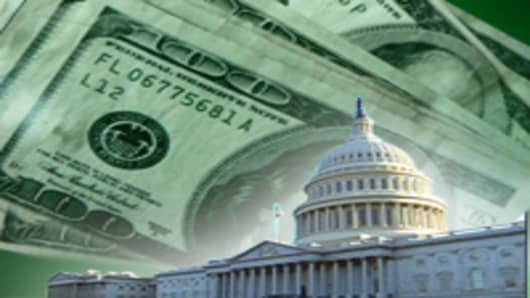Seeking to avoid a politically toxic vote, Congress has failed to pass a federal budget for three years. This year's new twist? Congress might not even try.
On Monday, President Obama presented his proposed budget for fiscal year 2013. It's going nowhere on Capitol Hill, legislators and political analysts agree.
What's more, Senate Democratic leaders show no intention of presenting their own budget proposals — or taking up any lobbed over from House Republicans.
Technically, they don't have to, Senate majority leader Harry Reid (D) of Nevada said on Feb. 3. He suggested that the terms of last summer’s debt-ceiling agreement provide all the guidance that Congress needs for the coming fiscal year.
Indeed, with three mammoth spending measures — the Bush-tax cuts, the payroll-tax holiday, and automatic spending cuts triggered by the debt-ceiling deal—that must be settled by Dec. 31, most likely by the lame-duck session of Congress after the November elections, there is little appetite among members to expend political capital now on a budget.
The cost, say analysts, is that Congress is once again allowing the federal budget process to remain rudderless and lawmakers unaccountable as the nation lurches toward fiscal crisis.
“Congress is legally required to consider a budget resolution every year, but there’s no penalty for not doing it, and no one has any standing to sue,” says Stan Collender, a longtime congressional budget analyst with Qorvis Communications in Washington.
Historically, the job of proposing and approving a budget has been a crucial one for the Congress.
While actual line-by-line spending decisions are made later, during the appropriations process, the budget is the one federal document that lays out a vision for the nation's finances. It is designed to be the moment when Congress takes a hard look at the books and makes sound plans for America's fiscal future.
The lack of a budget plan for the past three years has exacerbated America's fiscal problems because, for three years, Congress has not passed a roadmap to bring spiraling deficits under control.
Mr. Obama has made proposals that have been ignored. House Republicans actually passed a budget last year – the plan constructed by Rep. Paul Ryan (R) of Wisconsin that sought to rein in entitlements and bring down deficits. But it failed to pass the Senate, and Republicans took a huge political hit for the severity of Congressman Ryan's proposals.
Tax and Spend Decisions Due This Year
It is just such a political hit that, entering an election year, congressional leaders want to avoid. By averting a floor vote on a comprehensive budget package, congressional leaders protect vulnerable members from having to commit to deficits, tax hikes, or spending cuts that could hurt them at the polls.
“What avoiding a floor vote on a budget does is eliminate the need for members of Congress to go on record for or against a deficit,” says Mr. Collender.
The result: the emergence of Senator Reid's plan to avoid a budget vote altogether. Last summer's debt-ceiling deal did provide some budget guidance for parts of the federal government, Collender says. But it does not lay out plans for Social Security , Medicare , and interest on the national debt , he adds.
Together, those items account for 65 percent of federal spending, up from 42 percent in 1971. According to Obama's budget, that mandatory spending is expected to reach 78 percent of federal spending within 10 years.
Unless the public reacts to the lack of a budget – which is seen as unlikely for such a seemingly arcane issue – there’s little pressure on lawmakers to commit to votes on a comprehensive budget plan before November. And Congress has other issues on its mind.
Both Democrats and Republicans are already looking ahead to even tougher tax-and-spend decisions outside the budget process that come due after November. Here are the top tax-and-spend measures to be decided by Dec. 31, most likely in a lame-duck session of Congress.
- The Bush-era tax cuts are set to expire on Dec. 31. The Obama budget for fiscal year 2013 proposes extending tax breaks only for people with incomes less than $250,000. Many Democrats, especially from high-cost-of-living states like New York want to see those tax breaks extended for incomes up to $1 million.
- A 2 percentage point cut in Social Security payroll taxes, extended unemployment insurance, and the “doc fix” to avert cuts in reimbursement rates to doctors treating Medicare patients are all set to expire on Feb. 29. If extended, as expected, Congress will face another decision point on the entire $160 billion package on Dec. 31.
- The debt-limit deal mandates that Congress begin $1.2 trillion in automatic spending cuts, to be divided between defense and domestic spending, in January 2013. Congress has 10 months to come up with an alternative deficit-reduction package. Any agreement before the elections is seen as unlikely.


